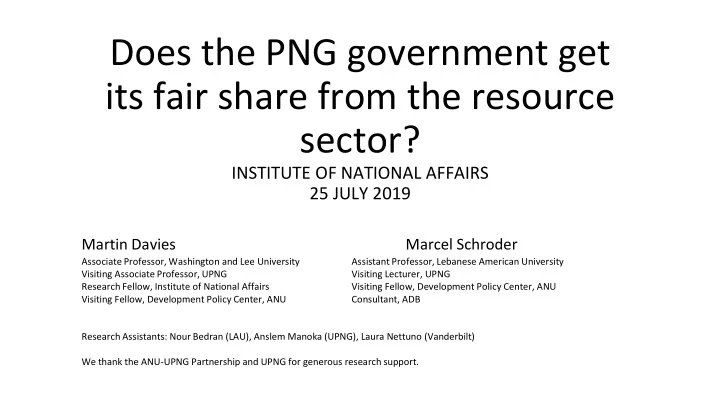

Does the PNG government get its fair share from the resource sector? INSTITUTE OF NATIONAL AFFAIRS 25 JULY 2019 Martin Davies Marcel Schroder Associate Professor, Washington and Lee University Assistant Professor, Lebanese American University Visiting Associate Professor, UPNG Visiting Lecturer, UPNG Research Fellow, Institute of National Affairs Visiting Fellow, Development Policy Center, ANU Visiting Fellow, Development Policy Center, ANU Consultant, ADB Research Assistants: Nour Bedran (LAU), Anslem Manoka (UPNG), Laura Nettuno (Vanderbilt) We thank the ANU-UPNG Partnership and UPNG for generous research support.
Plan for Today 1. Theory 2. Data 3. Policy Implications • resources fiscal regime • economy-wide
1. Bargaining Game: division of gains between two parties • Two parties: Government, MNC Dividing profit: you get more, I get less Profit, π GOV’T MNC
Nash Bargaining Framework •
Nash Bargaining Framework •
Simple Example •
Outside Options •
Bargaining Strength Governments bargaining strength, α, depends on: • Accountability to people – pressure to push for better deal • Increase transparency • Higher transparency → push for better deal • Political risk • Increased likelihood of disruption of project → decreases α → MNC better deal • Corruption • decrease α • Bureaucratic ability • Less able bureaucracy → less effective at negotiations → lower α MNC’s bargaining strength (1 - α) depend on: • Number of competitors (even if collaborating) • Sunk costs (exploration, construction) • How heavily invested is mnc?
What does model say about how to bargain? •
2. Resources Fiscal Regime
PNG’s Fiscal Regime (Simplified) Revenue from commodity sales Wellhead value (oil and Royalty 2%, Prod. gas) levy 0.25-0.5% Royalty, 2%, Taxable income to Production Development levy investors Cost 2%; Income After-tax profit Salary and tax 30% wage tax, Resource import tax, Gov’t Investor’s dividends rent and equity taxes GST (mostly Investor’s net Withholdin zero rated) dividends g tax 15% Investor’s Government revenue return
Tax Revenue from Resource Sector in 2017 Source: EITI 2017 data
PNG Government’s Total Resource Revenue Source: IMF and EITI
Estimate of PNG Government’s Take (% Resource GDP) Source: Authors
Government Take: Int’l Comparison Note: Calculations are based on EITI data excluding social contributions. Source: Authors
Payment Types: International Comparison Country Corporate Income Tax Royalties Gov’t Equity Social Contributions Papua New Guinea 5% 11% 28% 33% Mongolia 19% 37% 9% 7% Timor Leste 14% 58% 0% 16% Chad 2% 38% 37% 7% DR Congo 30% 10% 4% 10% Cote d’Ivoire 3% 16% 57% 8% Source: EITI
Does the PNG Government get its fair share? • Ideally, we use regression analysis which allows us to control for factors of bargaining strength as implied by the game-theoretic model (ongoing research). • However, PNG’s government take has declined substantially in recent years and seems low compared to other resource rich countries. • Salary and wage tax is largest payment received. PNG is the only country in our database of 50 countries where this is the case. • Corporate income tax and royalties seem unusually low.
3. Policy Recommendations: Fiscal Regime • PNG is a developing country which means funds for crucial spending such as infrastructure, health and education are needed today rather than tomorrow. Therefore, avoid deals with MNCs that lead to extreme back-load of fiscal take. • Also avoid giving too many incentives (loss carry forward arrangements, tax concessions, treating royalties as advance income tax, etc.). • Reconsider zero rating GST. Many resource rich countries derive significant revenue through GST. It is also relatively easy to administer. • Consider relying more on royalties on sales. They have many advantages • Revenue flows today vs tomorrow • More stable than income tax and other payments • Relatively easy to administer • Understand reasons behind low income tax payments. Is it only due to fall in commodity prices? • There seems no mechanism for gov’t to benefit from exceptionally high commodity prices (e.g. additional royalty, excess profi t tax) • In future, if deal offered by MNC isn’t attractive, valid to leave resources in the ground for later.
Policy Recommendations: Economy-wide •
Policy Recommendations: Economy-wide (ctd) •
Recommend
More recommend